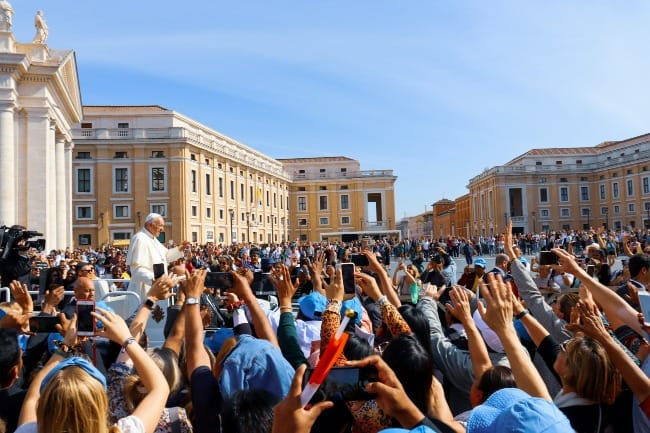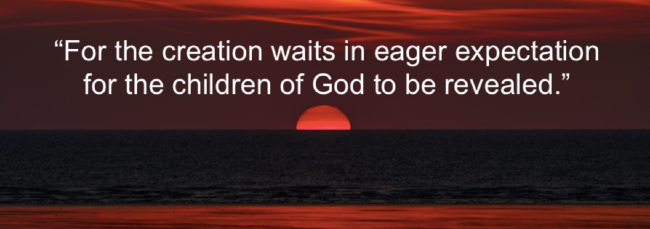On March 13, 2013, an energetic crowd gathered in Vatican City in eager expectation for the next pope to be revealed. Inside the Sistine Chapel, 115 Catholic cardinals gathered to vote. Their decision would have massive implications not only for the largest Christian denomination, but for the entire world.
After four rounds of balloting, black smoke continued to waft out of the chapel’s chimney, indicating that no candidate had received the required two-thirds majority to become the next leader of the Catholic Church. After the fifth ballot, the black smoke turned white and the bells of St. Peter’s Basilica began to ring: a pope had been chosen. The crowd cheered, and cheered again when Jorge Mario Bergogilio emerged on the balcony of St. Peter’s and revealed his new name: Pope Francis.

Since that moment, Francis has steadily revealed a lively and lovely vision of faith that integrates care for the poor with care for the earth. This vision is centered on an ecological understanding of creation in which God, humanity, and every aspect of creation are interconnected in a dynamic web of being. Francis’ vision also takes into account the inherent interconnections within human society, calling us to include and integrate the political, economic, social, cultural, religious, and spiritual dimensions of human life in our personal and communal discipleship. He imagines a faith that vibrantly reflects God’s active love and care for the whole world.
Setting aside for a moment legitimate critiques of the Catholic Church and its hierarchy, imagine what would happen if every follower of Jesus embraced Francis’ vision. I believe we would see the emergence of a faith that the world has been waiting for, one that would resonate with the profound declaration of Romans 8:19:

While this verse has some interpretive challenges, it clearly assumes a thoroughly interconnected world. It tells us that humans, and more particularly, the children of God, have a profound impact on creation. This echoes many other biblical texts that connect human behavior with both the flourishing and the diminishment of the non-human world (see, for example, Jeremiah 12:4). And while this verse points to a future moment when God will transform creation to fully reflect the divine glory and purpose, the New Testament’s witness is that this transformation has already started in Jesus Christ, and must be reflected in those who follow him now.
This is a difficult path; for hundreds of years we have been transforming the earth, but opposite to the way God intends. The intricate, yet fragile, life-giving systems crafted by our Creator are being overburdened and pulled apart by humanity. It is not an overstatement to say that we are tearing the fabric of life: climate systems are destabilizing, ecosystems are breaking down, species are disappearing, and vulnerable human populations are bearing a disproportionate share of the consequences. Most churches have watched this in silence, including nothing in their discipleship about our relationship to the non-human world. Worse, many have been actively complicit, preaching and teaching that active domination of creation is central to human identity and the will of God.
If we want a world in which these changes are slowed, stopped, and reversed – a world in which the whole community of creation thrives - we need a radical transformation of humanity’s worldview and way of life. For followers of Jesus, this requires an ecologically-conscious discipleship that models this transformation and helps move it forward.
Simply put, if we want to cultivate a faith that the world is waiting for, it must be as ecological disciples. I will begin to unpack what this means over the next few months of posts, but here is a brief overview.
Four R’s to Follow
Ecological disciples practice a fourfold movement: Repent – Reform – Reimagine – Repeat. We repent of our lack of concern for the non-human world, for our unbiblical practice of separation and domination, and for the ways we have contributed to Earth’s suffering. We reform our beliefs and practices so that they reflect God’s love and care for all creation. We reimagine our shared vocation of earthkeeping for a planet in peril. Finally, we repeat this cycle to continue our learning, and to build up knowledge and wisdom to hand down to future generations.
7 Shifts to Make
Ecological disciples recognize that we need to do more than just tweak existing models and practies of discipleship - the very foundations of faith need to be reexamined in light of the Bible and current reality. Here are brief descriptions of seven key shifts we need to make.
- A New Cosmology – From mechanistic universe to dynamic creation.
- A Bigger Story – From human-centered to the whole community of creation.
- A More Humane Humanity – From independent masters to interdependent servants.
- A Place-Based Discipleship – From generic Jesus-following to bioregional particularity.
- A Creational Mission – From saving souls/society to cultivating life in the new creation.
- An Interconnected Church – From splintered sects to creative collaborators.
- A Different Destination – From an earthless heaven to a heavenly earth.
This is a big endeavor and difficult process! I know firsthand how easy it is to get discouraged and overwhelmed – the first step is take a deep breath. This is God's work that we join, not the other way around. Grace and mercy pave the way. The journey may be long, but we can travel together. The task may be big, but each of us can discover our part to play.
I will unpack the Four R’s and Seven Shifts over the next few weeks of posts. Questions and comments are welcome!
It is my hope you that as you journey along, you will discover the faith that YOU’VE been waiting for!
With you on the Way,
James
Reflection Question: What is exciting, interesting, confusing, or concerning to you about this vision of faith?